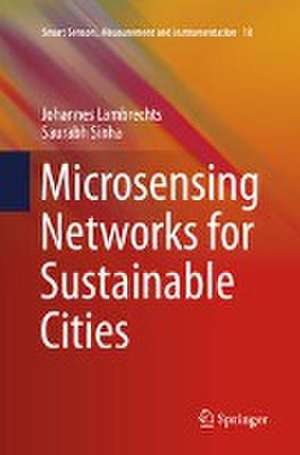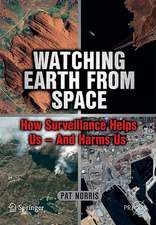Microsensing Networks for Sustainable Cities: Smart Sensors, Measurement and Instrumentation, cartea 18
Autor Johannes Lambrechts, Saurabh Sinhaen Limba Engleză Paperback – 30 mar 2018
| Toate formatele și edițiile | Preț | Express |
|---|---|---|
| Paperback (1) | 643.34 lei 6-8 săpt. | |
| Springer International Publishing – 30 mar 2018 | 643.34 lei 6-8 săpt. | |
| Hardback (1) | 649.54 lei 6-8 săpt. | |
| Springer International Publishing – 10 feb 2016 | 649.54 lei 6-8 săpt. |
Din seria Smart Sensors, Measurement and Instrumentation
- 15%
 Preț: 593.59 lei
Preț: 593.59 lei - 20%
 Preț: 1291.75 lei
Preț: 1291.75 lei - 15%
 Preț: 642.36 lei
Preț: 642.36 lei - 15%
 Preț: 638.43 lei
Preț: 638.43 lei - 15%
 Preț: 646.11 lei
Preț: 646.11 lei - 15%
 Preț: 648.24 lei
Preț: 648.24 lei - 20%
 Preț: 646.62 lei
Preț: 646.62 lei - 15%
 Preț: 649.22 lei
Preț: 649.22 lei - 15%
 Preț: 649.06 lei
Preț: 649.06 lei - 15%
 Preț: 639.90 lei
Preț: 639.90 lei - 15%
 Preț: 649.54 lei
Preț: 649.54 lei - 18%
 Preț: 1127.78 lei
Preț: 1127.78 lei - 5%
 Preț: 1098.84 lei
Preț: 1098.84 lei - 15%
 Preț: 639.90 lei
Preț: 639.90 lei - 18%
 Preț: 1009.54 lei
Preț: 1009.54 lei - 15%
 Preț: 648.89 lei
Preț: 648.89 lei - 18%
 Preț: 726.85 lei
Preț: 726.85 lei - 18%
 Preț: 1006.72 lei
Preț: 1006.72 lei - 18%
 Preț: 954.93 lei
Preț: 954.93 lei - 15%
 Preț: 633.19 lei
Preț: 633.19 lei - 15%
 Preț: 645.60 lei
Preț: 645.60 lei - 18%
 Preț: 957.44 lei
Preț: 957.44 lei - 18%
 Preț: 1109.92 lei
Preț: 1109.92 lei - 5%
 Preț: 712.97 lei
Preț: 712.97 lei - 24%
 Preț: 631.23 lei
Preț: 631.23 lei - 15%
 Preț: 639.08 lei
Preț: 639.08 lei - 15%
 Preț: 642.36 lei
Preț: 642.36 lei - 15%
 Preț: 646.62 lei
Preț: 646.62 lei - 18%
 Preț: 725.43 lei
Preț: 725.43 lei - 18%
 Preț: 1004.99 lei
Preț: 1004.99 lei
Preț: 643.34 lei
Preț vechi: 756.86 lei
-15% Nou
Puncte Express: 965
Preț estimativ în valută:
123.12€ • 128.06$ • 101.64£
123.12€ • 128.06$ • 101.64£
Carte tipărită la comandă
Livrare economică 15-29 aprilie
Preluare comenzi: 021 569.72.76
Specificații
ISBN-13: 9783319803340
ISBN-10: 3319803344
Ilustrații: XIV, 339 p. 93 illus.
Dimensiuni: 155 x 235 mm
Greutate: 0.5 kg
Ediția:Softcover reprint of the original 1st ed. 2016
Editura: Springer International Publishing
Colecția Springer
Seria Smart Sensors, Measurement and Instrumentation
Locul publicării:Cham, Switzerland
ISBN-10: 3319803344
Ilustrații: XIV, 339 p. 93 illus.
Dimensiuni: 155 x 235 mm
Greutate: 0.5 kg
Ediția:Softcover reprint of the original 1st ed. 2016
Editura: Springer International Publishing
Colecția Springer
Seria Smart Sensors, Measurement and Instrumentation
Locul publicării:Cham, Switzerland
Cuprins
Microsensing Networks for SustainableCities: Pollution as a Key Driving Factor.- PopulationGrowth in Developing Countries and Smart City Fundamentals. TheInternet-of-Things and Wireless Sensor Networks.- Modelling of Air and Water Pollution Sources.- Harvesting Energy from Ambient Sources: Wind Energy,Hydropower, Radiation and Mechanical Deformation.- The Sub-Systems of an Energy Harvesting Device: Focus on RFIDFundamentals.- Geographic Information Systems and Remote Sensing.- Ubiquitous Computing: Distributing Mobile Computing to Builda Global Network of Things.- Designing andPlanning for Sustainable Urbanism with Focus on Developing Countries.- Toolsand Facilitators towards Successful Planning for Sustainable Cities.- CaseStudies: Developing Countries Committed to an Ecologically Aware Future.
Notă biografică
Saurabh Sinha obtained his Ph.D. degree in Electronic Engineering from the University of Pretoria, South Africa. He has authored or co-authored over 85 publications in peer-reviewed journals and at international conferences. In addition, he is the managing editor of the South African Institute of Electrical Engineers (SAIEE) Africa Research Journal. Prof. Sinha served University of Pretoria for over a decade, his last service being as Director of the Carl and Emily Fuchs Institute for Microelectronics. Since 2013 he has been Executive Dean of the Faculty of Engineering and Built Environment at the University of Johannesburg. He was the 2014-2015 Vice-President, IEEE Educational Activities and serves on the IEEE Board of Directors.
Textul de pe ultima copertă
This book explores the microsensing technologies and systems now available to monitor the quality of air and water within the urban environment and examines their role in the creation of sustainable cities against the background of the challenges posed by rapid urbanization. The opening section addresses the theoretical and conceptual background of microsensing networks. The coverage includes detailed description of microsensors, supported by design-specific equations, and clear explanation of the ways in which devices that harvest energy from ambient sources can detect and quantify pollution. The practical application of such systems in addressing environmental impacts within cities and in sustainable urban planning is then discussed with the aid of case studies in developing countries. The book will be of interest to all who wish to understand the benefits of microsensing networks in promoting sustainable cities through better delivery of information on health hazards and improved provision of data to environmental agencies and regulatory bodies in order to assist in monitoring, decision-making, and regulatory enforcement.
Caracteristici
Describes microsensors in detail, with inclusion of design-specific equations Provides up-to-date information on wireless sensor networks and energy-harvesting devices Discusses the practical application and benefits of microsensing systems in addressing environmental impacts within growing cities Includes supplementary material: sn.pub/extras







